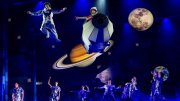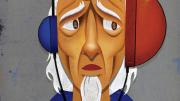On a recent Tuesday afternoon, Pardis Sabeti was not in her office at Harvard’s Center for Systems Biology, but en route to Manhattan—to play a gig that night at a club in the Meatpacking District with Thousand Days, the alternative-rock band for which she sings lead vocals and plays bass guitar. Though such weeknight gigs are rare and Sabeti admits she would choose science over music if pressed, the latter does not detract from her duties as assistant professor of organismic and evolutionary biology; the interaction, she says, is multiplicative, not subtractive. She keeps a guitar in her office to capture the songs that sometimes spill over during spells of scientific creativity. It was during just such a bout of “flow” that Sabeti made a landmark discovery in genetics. As a Rhodes scholar at Oxford in 2000, she was investigating a basic tenet of the field—that evidence of natural selection should be detectable on the human genome because beneficial variants spread quickly through populations. Many were searching for a way to find this evidence in the new data made available by genome sequencing; Sabeti was the first to devise a method, and her algorithm is now used routinely to identify areas of interest on the genome for further study. It was also at Oxford that she taught herself to play the guitar so she could help friends form a band. Aside from dabbling in piano lessons as a child, she had never before played an instrument, but, she says, she had been listening to music for so long that playing and writing followed naturally. In music and biology, experience has taught her, “If you do what you really love—find your passion—it comes easily.”
Pardis Sabeti
Pardis Sabeti
For this systems biologist, the interaction of science and music is multiplicative.

You might also like
At A.R.T., the Musical “Wonder” Explores Bullying and Friendship
Auggie Pullman’s story comes to life through an inventive space metaphor
Five Questions with Michèle Duguay
A Harvard scholar of music theory on how streaming services have changed the experience of music
Reese Witherspoon Visits Harvard—and Talks Women, Media, and AI
Reese Witherspoon discusses female-driven content at Harvard Business School.
Most popular
Explore More From Current Issue

A Forgotten Harvard Anthem
Published the year the Titanic sank, “Harvard’s Best” is a quizzical ode to the University.

Getting to Mars (for Real)
Humans have been dreaming of living on the Red Planet for decades. Harvard researchers are on the case.

A Near-Perfect Football Season Ends in Disappointment
A loss to Villanova derails Harvard in the playoffs.





